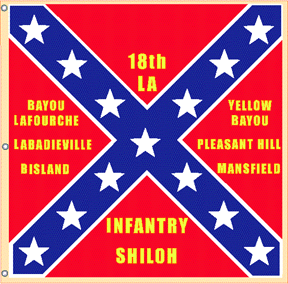Bush, Louis, Major F. and S.
18th La. Infty. Commsd. or apptd. Major, Oct. 5th,
1861. Camp Roman, La. Field and Staff Roll, June, 1862, Maj.
Bush absent with leave from May 2nd, 1862, and returned June
10th, 1862. Regtl. Return for June, 1862, Present. Elected
at late reorganization Lt. Col. Has not been assigned to new
office. Roll for July and Aug., 1862, Maj. Bush having
declined the Lt. Colcy. was dismissed from service July
10th, 1862.
The second company raised in this parish in
1861 was enlisted and commanded by Capt. Louis Bush. At the
organization of the 18th Regiment at Camp Moore, September
the 5th, 1861, Capt. Louis Bush was elected major without
any opposition. The major was a strict disciplinarian, a
excellent drill officer, and always had a paternal
solicitude for the walfare of the men under his command.
Always found at his post of duty he had the unlimited
confidence of both officers and men, which confidence was
ratified in gallantry and skill in the fights at Pittsburg
Landing and during the two days' engagement at Shiloh.
During the seige of Corinth, the major was unwell and had to
retire to the rear to recuperate. On the 15th of April 1862,
upon the reorganization of his regiment, he was unanimously
elected lieutenant colonel, and after the resignation of
Col. Roman, he was promoted to the colonelcy.
The army had fallen back to Tupelo before the health of
the colonel permitted him to return to the field, when he
assumed command of the 18th. Doubtful concerning his health,
he sent in his resignation, which was accepted, and much to
the sorrow of the regiment, he left us at Tupelo.
Subsequently, he served in the Trans-Mississippi
Department as A. A. G. to Gen. Mouton until the latter part
of 1863, when he succeeded in raising a regiment of cavalry,
which he commanded for some time, when he was appointed as
one of the judges of the Military Court in the
TransMississippi Department, stationed at Shreveport, which
position he occupied until the close of the war. The colonel
is a native of Iverville Parish but emmigrated to this town
when quite young. He was for many years clerk of the
district court, during the occupancy of which position he
studied law and in a short time became one of the most
successful practitioners in this section of Louisiana.
He served also several terms as a member of the popular
branch of the legislature and was senatorial delegate from
this parish and St. Charles to the convention which passed
the Ordinance of Secession.
During the session of this convention, the colonel was
one of the ablest and most eloquent opponent of said
ordinance, advocating what was known as the cooperation
policy.
But finding that the Ordinance of Secession was a
foregone conclusion, he voted for and signed the same, being
determined to stand by his people and his state in the great
step which the course of human events forced upon us at that
time.
At the close of the war , the colonel returned home and
resumed the practice of his profession. Upon the request of
Gov. Wells , he accepted the position of colonel of the
militia and was in process of effecting a thorough
organization of the same when military authority overthrow
and superceded the state government.
The colonel is a successful planter as wall as lawyer and
also takes a hand in politics occasionally.
He is now in fine health, with the proepect of many years
before him.
With his family, he is now luxuriating in the north and
west.


